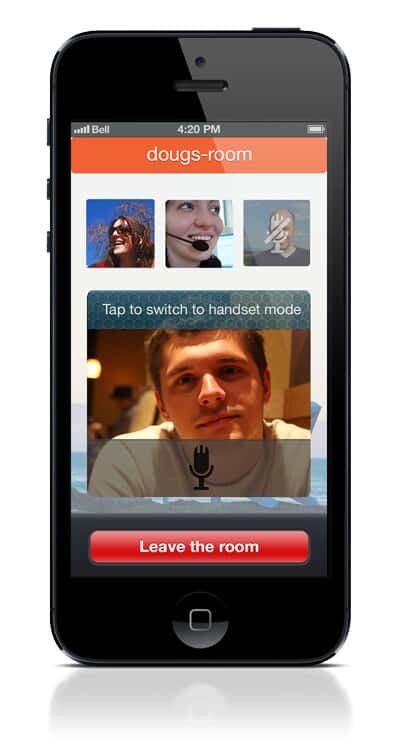Looking for a PaaS solution for WebRTC? That’s part of what Priologic offers.
There are many different providers of WebRTC APIs these days, and at times it can be hard to understand where the differences between them really are. Priologic is an interesting Canadian company that have been able to nail down an interesting model around WebRTC APIs.

Doug Pelton, Priologic’s and CEO was kind enough to answer some of my questions.
What is Priologic all about?
I founded Priologic in 2003 as a software development services company and mostly worked for Cisco Systems over the years. We are a boutique development company with just north of 20 people currently.
We got involved in WebRTC in early November, easyRTC our open source WebRTC bundle of joy! won the Best WebRTC Tools award at the WebRTC Conference and Expo in S. San Francisco after just 17 days!
What WebRTC solutions do you offer?
We have developed and offer three WebRTC packages as well as development services related to WebRTC.
easyRTC our Open Source WebRTC Bundle of Joy! This includes lots of WebRTC demo code that we developed and is really well documented, a lightweight signaling server built in node.js using express web server module and web sockets, and easyRTC.js a client side Javascript library that sits on top of WebRTC API and simplifies development.
easyRTC Enterprise builds on the open source version by adding a MySQL database to support real time monitoring, logging of many easyRTC events and developer driven logging. easyRTC Enterprise is currently delivered as a platform but eventually may be licensed to larger companies to run on premise. Our enterprise platform is built across a number of servers and includes load balancing, multiple WebRTC signaling servers, database servers and monitoring server.
The easyRTC Enterprise client API is a superset of the easyRTC API so anything built on easyRTC should also run on easyRTC Enterprise.
Finally, we’ve built tawk.com a free, secure and anonymous video chat solution, partially to load test easyRTC Enterprise, but it has taken on a life of its own. We noticed there were many WebRTC Conferencing solutions out or in progress. And we didn’t want to approach that head on as yet another conferencing solution.
We plan to extend tawk.com while continuing to keep it very light and simple, less is more.

There seem to be a lot of API platforms for WebRTC out there. What differentiates your solution from the rest of the pack? What’s your “secret sauce”?
Our main reason for doing this is so we weren’t tied to Google’s App engine. Especially for the enterprise I think that’s a must.
I think our special sauce is that you can download easyRTC start building on open source and then migrate to easyRTC Enterprise without rewriting any code.
Do you have any plans to launch other complete services?
Next is an iOS SDK and iOS version of tawk.com. This will happen over the summer sometime, July if I’m optimistic.

Some extensions to tawk.com will make it much more interesting especially with respect to notification. The timing for notification would seem to be a good fit with the iPhone release.
When someone enters one of my rooms and I’m not there, if I’ve left a room SMS contact, I could get a text notifying me with a picture as to who is connected. Then I could decide to jump on the call using the iPhone or Android (Chrome) based tawk.com.
What have you used for signaling in your services?
We’ve built our own signaling based on web sockets.
We provide a TURN server on the backend of easyRTC Enterprise. We’ve used an open source TURN server and it is completely hidden from the consumer end of things.
We also recently integrate JsSIP under the covers towards the Enterprise version of easyRTC API. We did a joint demo with Acme Packet around SIP integration at the show. We plan to broaden SIP integration by adding other popular SBC’s over the next few months.
There are some TCO issues that some developers might not yet be considering. I know some people that are saying WebRTC is easy. I don’t think that is true when you look at larger scale. There is a lot of effort we put into hardening and scalability of load balancers, WebRTC servers, database servers, monitoring server. Many skills are required, you need database admin, Unix SA, signaling server expertise, TURN server expertise, that most developers won’t have. By using a platform like easyRTC Enterprise they get quick time-to-market and huge cost saving. Much like the cloud in general.
Are you running on an IaaS provider such as AWS or using some other solutions?
We’re currently in the cloud on Linode. We are built on Ubuntu first but can run on many versions of Unix.
We don’t have any dependencies on Linode so we could move pretty much anywhere. We can also run on Windows.
Given the opportunity, what woud you change in WebRTC?
Nothing for now. I actually think WebRTC is kind of incomplete and that is the beauty of it. It’s a game changing technology and there are many cracks in it. So there are many opportunities right now for entrepreneurs.
What’s next for Priologic?
Figure out how to monetize the work we’ve done to date
–
The interviews are intended to give different viewpoints than my own – you can read more WebRTC interviews.

Nice,
what should be done to replace easyrtc server by ours.
Welp,
You’ll need to find or implement the missing functionality that you are using from easyrtc.